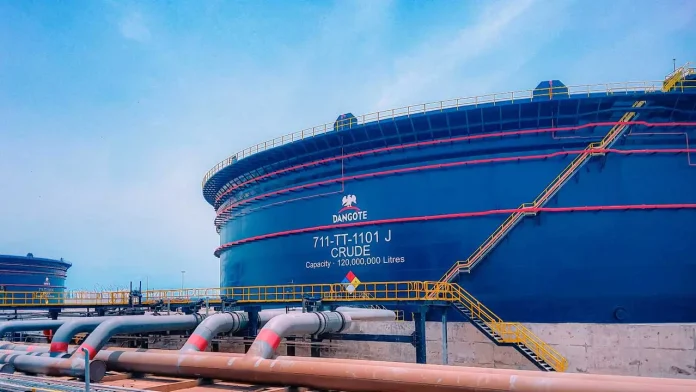Africa’s largest oil refinery faces mounting pressure from Nigeria’s petroleum workers union after laying off employees in what the company describes as a safety-driven reorganization to combat sabotage activities.
The Dangote Petroleum Refinery and Petrochemicals confirmed Friday that it had terminated workers as part of an “ongoing reorganisation within its facility,” citing repeated acts of sabotage that raised safety concerns and affected operational efficiency at the 650,000 barrel-per-day facility.
However, the Petroleum and Natural Gas Senior Staff Association of Nigeria (PENGASSAN) disputed the company’s characterization, alleging that over 800 Nigerian workers were unjustly dismissed to be replaced by more than 2,000 Indian workers.
The union accused the refinery’s management of terminating employees specifically because they had joined PENGASSAN, calling the action a violation of internationally accepted labor principles.
“We are deeply saddened to report the unjust termination of over 800 Nigerian workers, whose dedication and service have been integral to the operations of this plant,” PENGASSAN stated in a strongly worded response.
The company maintained that the reorganization was not arbitrary, emphasizing that safety concerns and operational efficiency issues necessitated the staff changes. Dangote Refinery stated that more than 3,000 Nigerian staff continue working at the facility, though it did not confirm specific layoff numbers.
A leaked termination letter dated September 25 showed at least one worker being informed of immediate dismissal, with the effective date listed as the evening of that day. The correspondence sparked widespread concern among the workforce about additional potential layoffs.
PENGASSAN Secretary General Lumumba Okugbawa condemned the layoffs entirely, describing them as “totally wrong” and calling for immediate corrective action. The union has summoned an emergency National Executive Council meeting to address the crisis.
The dispute emerges as the refinery continues facing operational challenges. The facility shut down its gasoline unit in late August for repairs expected to last 2-3 months, forcing increased fuel oil exports during the maintenance period.
Shipping data from Kpler indicates that the plant exported higher volumes of fuel oil in September, a typical pattern for modern refineries during outages or maintenance operations. The refinery began processing crude oil in January 2024.
The Dangote complex represents a significant milestone for Nigeria’s oil industry, creating what analysts describe as a new swing supplier in the Atlantic Basin with potential to reshape global fuel trading patterns.
However, the current labor dispute threatens to overshadow the refinery’s strategic importance. PENGASSAN has threatened to picket the facility if the mass layoffs are not reversed, potentially disrupting operations at a critical time.
The union argues that replacing qualified Nigerian workers with foreign personnel undermines local employment opportunities and violates the spirit of domestic content requirements that typically govern major industrial projects in Nigeria.
In its defense, Dangote Refinery stated that it “upholds internationally accepted labour principles including the right of every worker to freely decide whether or not to join a union,” suggesting the layoffs were not motivated by union membership.
The National Association of Nigerian Students has waded into the controversy, warning against any attempts to sabotage refinery operations through labor disputes. The student organization appears concerned that prolonged industrial action could affect fuel supply stability.
The timing of the dispute adds complexity to Nigeria’s energy sector challenges. The country has historically relied on imported refined products despite being Africa’s largest crude oil producer, making the Dangote facility strategically important for domestic fuel security.
Industry observers note that modern refineries typically face challenges during startup phases, including operational efficiency issues, maintenance requirements, and workforce optimization needs that can create labor relations tensions.
The alleged sabotage activities mentioned by Dangote Refinery management have not been publicly detailed, leaving questions about the specific incidents that prompted the reorganization and whether they involved current or former employees.
Labor relations experts suggest that resolving the current dispute will require dialogue between management and union representatives to address both legitimate safety concerns and worker protection issues.
The outcome of this controversy could influence future labor practices at other major industrial facilities in Nigeria, particularly those involving significant foreign investment and technology transfer arrangements.
As Nigeria seeks to expand its refining capacity and reduce dependence on imported petroleum products, maintaining stable labor relations at facilities like Dangote Refinery becomes crucial for achieving energy security objectives.
The refinery’s management faces pressure to balance operational safety requirements with local employment commitments while navigating complex relationships with multiple stakeholders including unions, government agencies, and international partners.
Source: newsghana.com.gh











